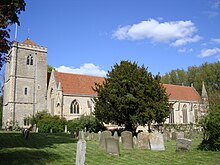Dorchester Abbey
| Dorchester Abbey | |
|---|---|
| Abbey Church of St Peter & St Paul, Dorchester | |

Dorchester Abbey viewed from the south
|
|
| Country | United Kingdom |
| Denomination | Church of England |
| Previous denomination | Roman Catholic |
| Website | Dorchester Abbey |
| History | |
| Founded | 1140 |
| Founder(s) | Alexander, Bishop of Lincoln |
| Cult(s) present | Saint Birinus |
| Relics held | Shrine of Saint Birinus |
| Past bishop(s) | Saint Birinus |
| Administration | |
| Diocese | Oxford |
| Clergy | |
| Vicar(s) | Rev. Sue Booys |
The Abbey Church of St Peter and St Paul, more usually called Dorchester Abbey, is a Church of England parish church in Dorchester on Thames, Oxfordshire, about 8 miles (13 km) southeast of Oxford. It was formerly a Norman abbey church and was built on the site of a Saxon cathedral.
Alexander, Bishop of Lincoln founded Dorchester Abbey in 1140 for the Arrouaisian Order of Augustinian canons (who wore white instead of the black of most Augustinians). Dorchester had been a Roman town and was later adopted by the Mercians. It had been the seat of a bishopric from AD 634 when Pope Honorius I had sent Saint Birinus, its first bishop, to that district, until 1085 when the Mercian See (hitherto at Dorchester) was transferred to Lincoln.
The abbey, founded fifty-five years later, was dedicated in honour of Saints Peter and Paul and Birinus. It was richly endowed out of the lands and tithes of the former bishopric, and had twelve parishes subject to it, being included in the Peculiar of Dorchester, until the suppression of peculiars. The first abbot appears to have been Alured, whose name occurs in records from in 1146 and again in 1163. The last was John Mershe, who was elected in 1533, and in the following year subscribed to the king's supremacy, with five of his canons, and was given a pension of £22 a year (equivalent to £13,460 in 2015). The revenues of the abbey were valued at the time of its suppression at about £220 (equivalent to £134,596 in 2015). Henry VIII reserved the greater part of the property of the house for a college, erected by him in honour of the Holy Trinity, for a dean and prebendaries; but this was dissolved in the first year of his successor.
...
Wikipedia
